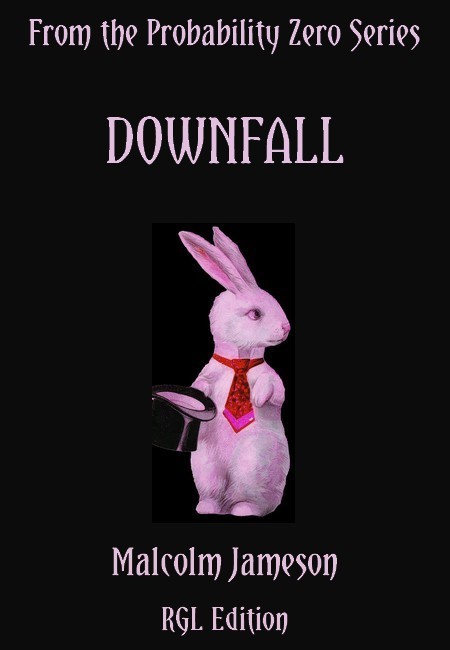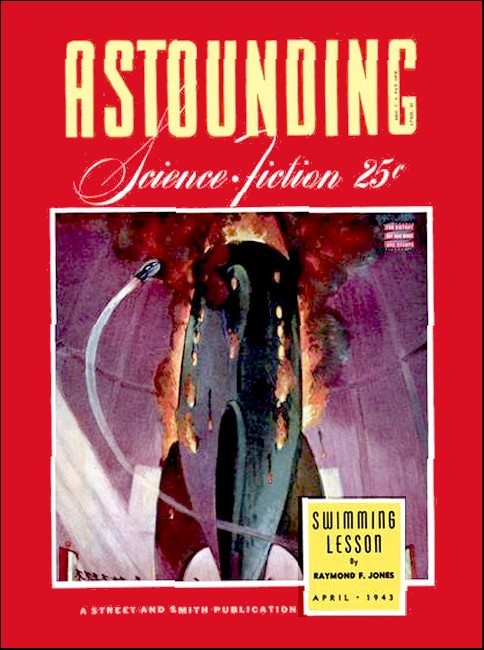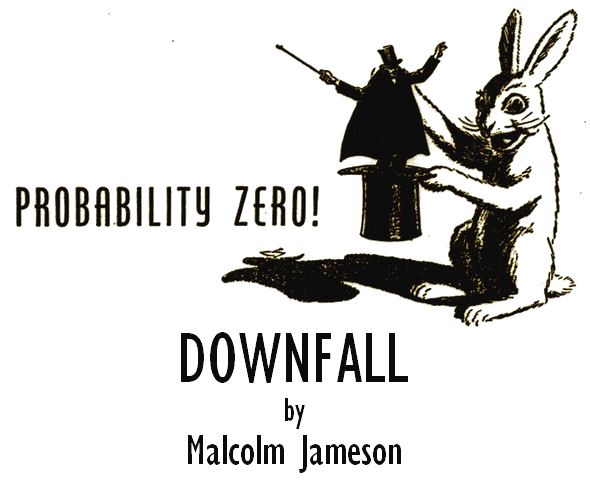
RGL e-Book Cover©
Roy Glashan's Library
Non sibi sed omnibus
Go to Home Page
This work is out of copyright in countries with a copyright
period of 70 years or less, after the year of the author's death.
If it is under copyright in your country of residence,
do not download or redistribute this file.
Original content added by RGL (e.g., introductions, notes,
RGL covers) is proprietary and protected by copyright.

RGL e-Book Cover©


Astounding Science-Fiction, April 1943, with "Downfall"
IN April 1942 Astounding Science-Fiction launched an open-ended series of "tall stories" under the general title "Probability Zero!" Writers were invited to submit contributions as entries in a competition, with prize money going to the first-, second- and third-placed stories each month.
The first three items published in the new series were: "Some Curious Effects of Time Travel," by Sprague de Camp; "Pig Trap," by Malcolm Jameson; and "Time Pussy," by George E. Dale.
Following the third item, the Editor printed the following description of the new series:
... The little items preceding were concocted, of course, by a sound trio of first-class, professional liars. In a length of this sort—some five hundred to seven hundred and fifty words—I think that there ought to be a number of excellent amateur liars, though. There may or may not be a "Probability Zero" department next month; the succeeding issue, however, will certainly have one—one concocted by amateurs and professionals alike. This month's supply of examples were bought at our standard space-rates; hereafter "Probability Zero" will be conducted as an open contest, wherein anyone equipped with a good, round prevarication is welcome. Readers will be invited to vote for the best of those published; the author of the winner will get twenty dollars, second place acquires ten, and third gets our check for five. Checks will be mailed as soon as the issue is decided.
To define the essence of the thing: We want science-fictional masterpieces that sound almost possible, but which are, as the department title states, "Probability Zero"—impossible by reason of known scientific law or by definition. They must be typed, double-spaced, and on one side of the usual size typewriter paper.
The old gag about truth being stranger than fiction is founded soundly; many an actual truth is highly implausible. We're looking for the exact reverse-something that's absolutely untrue, but highly plausible sounding.
For instance, it's a fact that a powerful jet of air—a real, roaring blast of air—will not blow a ball away; it will hold even a solid, fairly dense ball like a billiard ball supported in midair, pulling it back into the hardest, fastest part of the air-blast if it tries to waver out. That is obviously implausible; it happens to be true. It is also true that if you have a rope or chain running rapidly over two pulleys, with a considerable amount of slack in the chain, you can bend the chain's course into a loop—and have the loop stay there after removing the original deflecting force. The rapidly-moving chain will faithfully trace a course around the obstacle long after it has been removed, following a complicated S-course, even though under considerable tension. That's a rather implausible fact.
If facts can be that implausible, a good plausible lie should be fairly easy.
Click here to access a detailed bibliography of the Probability Zero! series in the Internet Speculative Fiction Database.
—Roy Glashan, 30 March 2022

WHENEVER Noonan, the former chief technician of the War Inventions Board, saw fit to loosen up and spill some of the inside dope on the last war, we all listened, naturally, though I must say some of the things he let leak out were fanciful beyond belief. So, the night we gathered around the table in the back room of Jake's place and he asked us if we had ever heard the true lowdown on how the Nazis came to lose the war, we promptly chorused an eager "No." He took a drag at his highball and began.
"We used an Earliwell implosion bomb—the only one that was ever made, by the way. It was a fragile-looking thing, that bomb, something like a bubble dancer's balloon, but at that it weighed enough to start falling, and that was all that was needed. You see, an implosion bomb works on exactly contrary principles from one of the explosive variety; instead of erupting matter with great speed and violence, it inrupts it, getting heavier rather than lighter all the time, so that its terminal weight may be anything. It sucks into itself whatever it comes in contact with—air, water, land, or what have you; whatever it hits ceases to exist except as a freshly incorporated part of the bomb itself.
"We took it over Germany in a bomber, being careful not to touch off its fuse until it was well over the side or otherwise the plane and its crew would be imploded, too—and at the wrong moment. Munich was the target, but when we got there the ack-ack was pretty hot, and since it did not matter particularly where we dropped it, we heaved it over into an empty field. The bomb got away clean and started down very nicely. In fact it fell rather faster than even a solid iron one would have, for there was no resistance from the air. Every molecule of that it encountered promptly became part of the bomb.
"Very well. The bomb hit the ground and went on in. Since the earth melted under it the instant of contact and was at once imploded, the bomb continued on downward in free fall. It was just as if it had been in vacuum. I forget how long it took now, but it was quite a long time before it got to the center of the earth. By then its weight was colossal—probably approaching that of dwarf-star stuff—and it was hitting it up at a terrific rate of speed. So it went on and up, that time, until it hit the bottom of the Pacific and came up and out and went on toward the stars."
"Hey!" protested Charlie Wintergreen, "you can't do that to me. Why didn't it stick at the center of gravity?"
"Why should it?" asked Noonan mildly. "What was there to stop it? Momentum, my boy, is something you can't laugh off, and there was no way to brake the thing since everything it brushed against went out of existence." Charlie looked doubtful about that, but grunted a little and said go on.
"You may remember that about that time an Anzac patrol cruiser reported a strange maelstrom appearing a few hundred miles south of the Society group? No one could see the bomb emerge, of course, since by its nature it could not entrain water into a waterspout, and was going so fast by then as to be invisible. Likewise, no one followed the bomb on its trajectory, so the explanation of what occurred is purely theoretical. However, the subsequent results bear abundant testimony that what I am telling you is how it happened.
"Some hours later a geyser of superheated steam appeared near Munich, and after that—"
"Now, listen," objected Charlie, a little angry now, "we let you have your way about your fancy bomb. After all, you did provide it with continually increasing inertia. But water simply wouldn't act like that—not if the whole Pacific fell into the hole. It would fall back when it reached the same height on our side."
"Not a bit of it. You forget the water picked up additional oomph on the way, too. Heat, mostly—heat from the earth's core, and also from the friction as it blew past it. Anyway, it came out on the European side with a velocity that was no less than terrible. The superheated steam must have made it to the upper stratosphere in practically nothing flat. And it induced vertical air currents with the effect that for a day or so Germany had a stationary tornado of national proportions. Most of the buildings were blown down by the inrushing surface winds, if you remember. Then came the hail—if you call ice in thousand-ton chunks hail. You see, all that steam hitting the stratosphere had to condense, and when it did it fell back. The ice fall finished what the winds began. The Nazis folded up—what was left of them."
"Why did it quit so abruptly?" challenged Charlie, still unmollified. "It seems to me that as long as there was water left in the Pacific the thing would keep on going."
"Cave-ins," explained Noonan simply, "from both ends of the tube simultaneously. The stuff met itself in the middle and plugged the hole. Now we're back to normal."
"Humph," snorted Charlie. "The history books mention the winter of 1943 as a humdinger with violent gales and heavy snows, but—"
"You wanted the real low-down, didn't you?" asked Noonan. That time he finished his drink in one big swallow.
Roy Glashan's Library
Non sibi sed omnibus
Go to Home Page
This work is out of copyright in countries with a copyright
period of 70 years or less, after the year of the author's death.
If it is under copyright in your country of residence,
do not download or redistribute this file.
Original content added by RGL (e.g., introductions, notes,
RGL covers) is proprietary and protected by copyright.